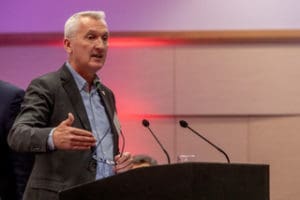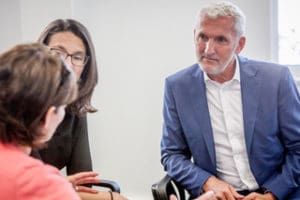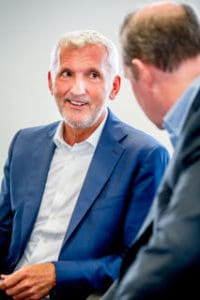‘Connecting People – Creating Opportunity’. Member Spotlight: Howard Le Cornu
What if the energy released and burnt by conflict was instead catalysed to generate connections and foster greater harmony among individuals? Such a ground-breaking idea stands at the heart of the vision of Howard Le Cornu, conflict resolution specialist, and mediator from the Channel Islands in the United Kingdom. With more than 20 years of experience in the field, Howard is also Founder and Chair of The Resolution Centre, a social enterprise engaged with coaching and mediation in order to assist individuals and organizations to positively navigating through conflict and challenging times. ‘Connecting people – creating opportunity’ is the main credo for Howard, who deeply believes in the creation of synergies stemming from the genuine encounter of human beings.
Leading as a coach, not a captain.
 With a past as a navigator and ships’ captain, Howard owns a Master of Business Administration with a specialization in Innovation and Entrepreneurship. “The command-and-control kind of style of leadership typical of the nautical world was not my style naturally” he recounts, “so I decided to earn an MBA in Innovation and Entrepreneurship because I felt drawn by the creative side of innovation”. Certainly, this latter educational experience was decisive in Howard’s life, as it introduced him to a strikingly different way of working….and, most importantly, of leading. In his subsequent role as the management CEO of the port of Jersey, Howard reached the conclusion that his own style of leadership had to largely differ from the traditional style hinged on a hierarchical order of superiors and subordinates. Rather, he wanted “to lead more as a coach than as a captain”. To pursue such ambition, he earned a Coaching training by the London School of Coaching. “The training I took in London was pivotal to me, since it allowed me to start to see how to empower people through leadership and coaching” Howard says, “by not telling those people what to do, but more by helping them finding out for themselves what to do”.
With a past as a navigator and ships’ captain, Howard owns a Master of Business Administration with a specialization in Innovation and Entrepreneurship. “The command-and-control kind of style of leadership typical of the nautical world was not my style naturally” he recounts, “so I decided to earn an MBA in Innovation and Entrepreneurship because I felt drawn by the creative side of innovation”. Certainly, this latter educational experience was decisive in Howard’s life, as it introduced him to a strikingly different way of working….and, most importantly, of leading. In his subsequent role as the management CEO of the port of Jersey, Howard reached the conclusion that his own style of leadership had to largely differ from the traditional style hinged on a hierarchical order of superiors and subordinates. Rather, he wanted “to lead more as a coach than as a captain”. To pursue such ambition, he earned a Coaching training by the London School of Coaching. “The training I took in London was pivotal to me, since it allowed me to start to see how to empower people through leadership and coaching” Howard says, “by not telling those people what to do, but more by helping them finding out for themselves what to do”.
Mediation is not only about the heart of the conflict.
 Moved by the desire to start something on his own that could make him earn some money while at the same time bringing to others the best of himself, which Howard had discovered in the coaching dynamics, he chose to take a second coaching training in 2015. Here, he unexpectedly bumped into mediation, though his initial view on it was rather distorted. “At that time, I did not know very much about it” Howard admits, “my perception of a mediator was very poor, as somebody who is a little bit passive, helping just calm the waters and say ‘talk nicely to each other, that is better’, but that is not what found when getting to grips with mediation”. By getting to know other mediators, who demonstrated to be very enthusiastic of Howard’s attitude, and thanks to a direct experience within the British hospitals and health services, he got soon passionate about the power of mediation practice, especially in its incredible ‘ripple effect’ dimensions. “You start to see how a process like mediation can seriously change things for the better both for the people directly involved in the conflict and for the way this ripples on how these individuals work within the society, such as in the case of doctors and their patients”, he concedes enthusiastically, “mediation is not only about those in the heart of the conflict”. Howard harks back to the morning he sat as an observer and co-facilitator of a mediation session with the personnel of the National Health Service as the epiphanic moment he remained astonished by the drive of mediation. “I will always remember going through this process, which was rigorous and very professional but heart compassionate, and seeing how they changed over a matter of two days” he describes, “that was for me the Eureka moment”. Even more powerful was the understanding of how mediation re-engages people, and that in health services evidence shows that when people engage, patient mortality is reduced – lives can be saved.
Moved by the desire to start something on his own that could make him earn some money while at the same time bringing to others the best of himself, which Howard had discovered in the coaching dynamics, he chose to take a second coaching training in 2015. Here, he unexpectedly bumped into mediation, though his initial view on it was rather distorted. “At that time, I did not know very much about it” Howard admits, “my perception of a mediator was very poor, as somebody who is a little bit passive, helping just calm the waters and say ‘talk nicely to each other, that is better’, but that is not what found when getting to grips with mediation”. By getting to know other mediators, who demonstrated to be very enthusiastic of Howard’s attitude, and thanks to a direct experience within the British hospitals and health services, he got soon passionate about the power of mediation practice, especially in its incredible ‘ripple effect’ dimensions. “You start to see how a process like mediation can seriously change things for the better both for the people directly involved in the conflict and for the way this ripples on how these individuals work within the society, such as in the case of doctors and their patients”, he concedes enthusiastically, “mediation is not only about those in the heart of the conflict”. Howard harks back to the morning he sat as an observer and co-facilitator of a mediation session with the personnel of the National Health Service as the epiphanic moment he remained astonished by the drive of mediation. “I will always remember going through this process, which was rigorous and very professional but heart compassionate, and seeing how they changed over a matter of two days” he describes, “that was for me the Eureka moment”. Even more powerful was the understanding of how mediation re-engages people, and that in health services evidence shows that when people engage, patient mortality is reduced – lives can be saved.
The Resolution Centre.
 After experiencing and practicing the power, impact, and potential mediation in close relation with NHS members, Howard made return to his homeland, Jersey, located in the Channel Islands. Together with other two partners, in 2016 he founded The Resolution Centre, a social enterprise aimed at fostering a more peaceful and synergic society by resorting to services such as Leadership & Team Development, Mediation & Resolution, Executive & Talent Coaching, and Business Consultancy. In the words of Howard, the vision moving their business is “to promote harmony into society [..] by embracing and harnessing the energy of conflict, and not just trying to make peace”. In other words, their aim is to constructively transform the motion released by conflict into something positive for the people affected by the conflict and their surroundings, “building rather than just pacifying people”.
After experiencing and practicing the power, impact, and potential mediation in close relation with NHS members, Howard made return to his homeland, Jersey, located in the Channel Islands. Together with other two partners, in 2016 he founded The Resolution Centre, a social enterprise aimed at fostering a more peaceful and synergic society by resorting to services such as Leadership & Team Development, Mediation & Resolution, Executive & Talent Coaching, and Business Consultancy. In the words of Howard, the vision moving their business is “to promote harmony into society [..] by embracing and harnessing the energy of conflict, and not just trying to make peace”. In other words, their aim is to constructively transform the motion released by conflict into something positive for the people affected by the conflict and their surroundings, “building rather than just pacifying people”.
Howard dedicates most of his time to cases of direct mediation, such as of conflict in the groups and teams, and he is highly engaged with both coaching and training as well, particularly with Senior Board Teams both in the public and the private sector, helping these latter to effectively tackle internal issues in a way that promotes the personal wellbeing of the participants and improve the overall organisational outcome. Howard and his team are also focusing on the educational sector. Not only they managed to establish contacts with Queen Margaret University to bring students to Jersey as part of their postgraduate specialization in Dispute Resolution, but they are also developing a peer mediation course to be added to schools’ curricula in the Channel Islands and elsewhere.
The need to revisit leadership.
A great deal of the work Howard brings forward within organisations and boards through leadership workshops is directed at revisiting and reinventing the existing paradigm of leadership. In his experience, most leaders fundamentally lack two elements: authenticity and compassion. “From my perspective in many instances there exists a lack of leadership in the sense of lack of leaders that can empathize with their subordinates” he acknowledges, “in this way the lack of empathy is the biggest missing ingredient of modern leadership”. Why would anyone choose to trust a leader if they don’t think it’s in their personal interest to do so?
 Moreover, instead of collaborative models, the modern workplace is soaked with an adversarial and conflict-promotion culture that quickly creates polarization and adversary among co-workers. Such a product of the older generations easily alienates the individual rather than safeguarding his wellbeing, and such a burden weighs on the generations to come. Therefore, “we should coach the new generations in a way that allows them to understand themselves better,” Howard says, “to develop a generation of more authentic value-based leaders”. In Howard’s conception, at the core of this leadership type stands the high level of awareness of the leaders towards their own values and the capacity to relate, honour and respect the values of their subordinates. In all this, mediation can and has to play a crucial role. “I tend to say that mediation is the best-kept secret from leadership, because leaders do not realize how much mediation, underpinned by discussion, negotiation and a value-based approach, can be a game-changer in our culture”, Howard concludes.
Moreover, instead of collaborative models, the modern workplace is soaked with an adversarial and conflict-promotion culture that quickly creates polarization and adversary among co-workers. Such a product of the older generations easily alienates the individual rather than safeguarding his wellbeing, and such a burden weighs on the generations to come. Therefore, “we should coach the new generations in a way that allows them to understand themselves better,” Howard says, “to develop a generation of more authentic value-based leaders”. In Howard’s conception, at the core of this leadership type stands the high level of awareness of the leaders towards their own values and the capacity to relate, honour and respect the values of their subordinates. In all this, mediation can and has to play a crucial role. “I tend to say that mediation is the best-kept secret from leadership, because leaders do not realize how much mediation, underpinned by discussion, negotiation and a value-based approach, can be a game-changer in our culture”, Howard concludes.
Guided by the wise words of Ken Cloke, Howard joined MBBI three years ago. He demonstrates great enthusiasm for the potential of the organization, powered by technological developments, and he is eager to assist more concrete progress to maximize such potential. “The conversations brought forward by MBBI are very powerful,” he tells, “but there is the need to find some more practical efforts to get involved within the way the power of the single individuals and members can be collectively joint to carry on a more sustained action at different levels”. Can this represent the kicking point for the creation of a European and UK MBBI Chapter?
Written by Matteo Piovacari: MBBI Writer
